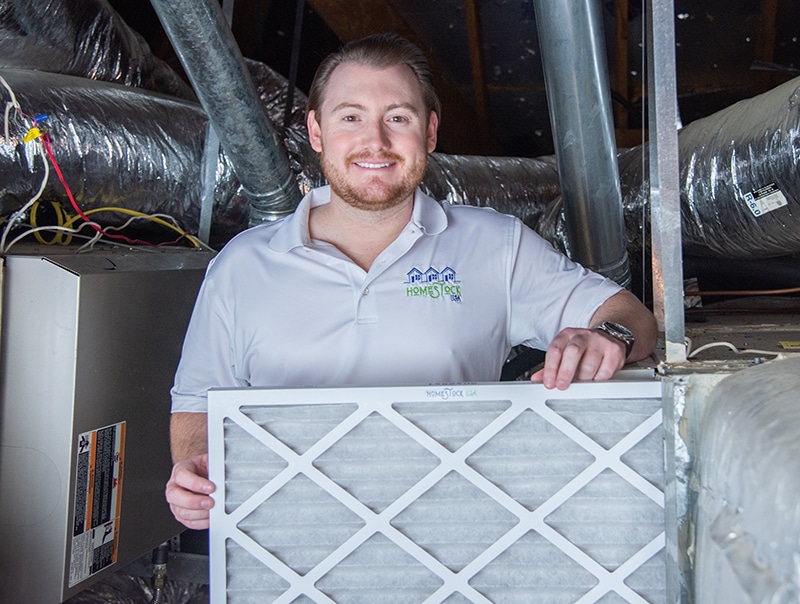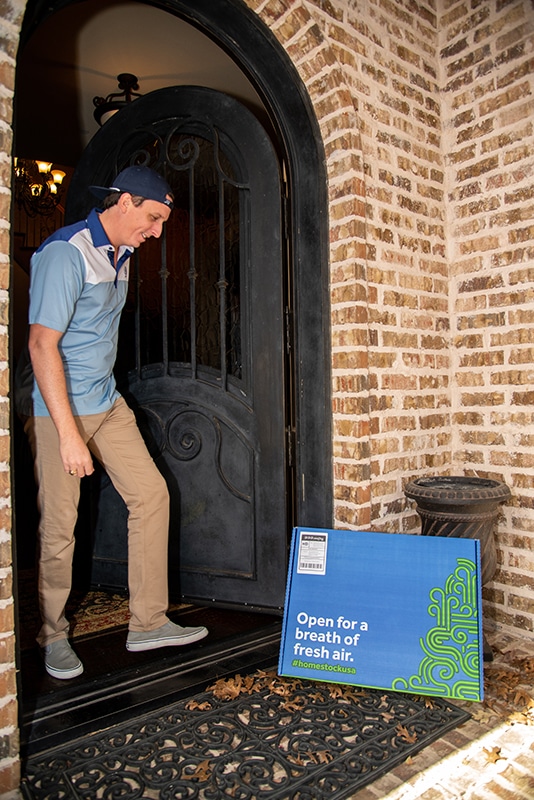
Homestock USA is the result of our desire to provide a cleaner indoor home environment to every individual. As times today have shown us, anything can happen, even global pandemics! We are spending more and more time indoors than ever before, buying new pets, and coping with the uncertain world we live in.
But one thing we can and want to help with is your home environment, and it starts with the air you are breathing right now.
Studies have shown that on average, people spend up to 90% of their time indoors. According to the Environmental Protection Agency (EPA), the indoor air we are exposed to is 70% more polluted than the air outside and they’ve ranked poor indoor air quality among one of the top public health risks. So what can you as a homeowner do about it? Changing your HVAC air filter is a great place to start. Getting the right filter for your home is extremely important to help keep allergies at bay, stop virus carriers from spreading, and even help with every day dust and dander.
Our mission is simple, we want to help improve your indoor air quality and promote a healthier/cleaner home. There are many ways to achieve this – including changing your air filter. Would you believe that 29% of Americans have never changed their air filter? Or that 82% of Americans today do not change their air filters on a regular basis, and likely don’t have the correct rated filter for their needs? There are many benefits to changing your air filter at the frequency that your home and HVAC system need, including:

There are numerous factors that impact the frequency at which you replace your filter. We are here to provide you with facts and knowledge that will allow you to make an informed decision. First, lets discuss external factors that should be taken into consideration.
You might be wondering how those impact your indoor air quality. According to the EPA, there are three mechanisms by which outdoor air enters into your indoor air circulation. They are neutral ventilation, infiltration, and mechanical means. Neutral ventilation occurs anytime you open a door or window in your home. Infiltration is exactly what it sounds like, outside air infiltrating your home through cracks in your walls, floors, or ceiling or broken seals on your windows or doors. Lastly, mechanical means refers to air intakes or fans associated with your HVAC system or preexisting ventilation systems (ie: if you have a vent fan in your bathroom that vents directly outside.). All homes can expect to have some combination of these three impacting the amount of outdoor air that is entering into their home and ultimately circulating through their system. Now that you know how the outdoor air gets inside, consider the above external factors and how they are possibly impacting not only the air you breathe but the air that your system is filtering.
Secondarily, there are many internal factors that should also be taken into account when determining the frequency with which you change your filter. Ask yourself the below questions.
If you answered “yes” to any of those questions, it is advised that you change your filter more frequently. It is generally suggested that you change a 1 or 2 inch filter every 1-3 months and a 3 or 4+ inch filter every 3-6 months. We urge you to take into account all of the environmental and internal indicators above when making your frequency selection.
If you live in an area that experiences high pollen, high smog or air pollution, live in a rural area where you frequently stir up dirt and sediment near your home, it is recommended that you change your air filter more frequently. If you are taking extra precautions to protect those living in your house, it is recommended that you change your air filter more frequently. The benefits outweigh the risks when you consider replacing your filter more often than waiting longer periods between changes.
Lastly, if you are someone who doesn’t change their filter regularly, we want you to know that can be impacting your health or the health of anyone spending time in your home. According to the EPA, there are a variety of symptoms associated with poor air quality. They include:
We trust that you are the expert on your own home and the needs of everyone living there. If anyone in your home is suffering from any of the above symptoms on an ongoing basis we recommend you consider how often you are changing your filter and make necessary changes. In addition to your filter change frequency, you need to ensure you are using the right MERV rated filter for your house. Check out our MERV info using the tabs above.
MERV stands for Minimum Efficiency Reporting Value. MERV is the measurement scale that was designed by the American Society of Heating, Refrigerating and Air-Conditioning Engineers (ASHRAE) to report the effectiveness of air filters. This is important because your MERV rating indicates the size particles (microns) that your filter is capable of removing from your air.
We offer three MERV ratings – 8, 11, and 13. The higher the MERV rating the smaller the particle size that is able to be filtered out of your air. Our filter capabilities are as follows:
MERV 8 is capable of removing 3.0-10.0 micron particles.
MERV 11 is capable of removing 1.0-3.0 micron particles.
MERV 13 is capable of removing 0.3-1.0 micron particles.
| MERV 8 | MERV 11 | MERV 13 | |
|---|---|---|---|
| Pollen | X | X | X |
| Mold | X | X | X |
| Dust | X | X | X |
| Dust Mites | X | X | X |
| Bacteria | X | X | X |
| Pet Dander | X | X | |
| Allergens | X | X | |
| Smog | X | ||
| Smoke | X | ||
| Cooking Oil | X | ||
| Virus Carriers | X | ||
| Starting at $12.89 | Starting At $16.89 | Starting At $20.89 |
Getting the right size is extremely important. If the filter is too big, it will not fit in your units or walls/ceilings. If it is too small, it will leave gaps where particles can get through. There are two ways to determine the size of your filter(s):
If you need further assistance with ensuring the measurements are right, you can contact us at support@homestockusa.com where we can help guide you real time.
We always say, you are the expert on your home and that especially rings true when picking a MERV rating for your filter. There are instances where it is not advised to use a MERV 13 in your HVAC unit. For example, if your home was built several decades ago and your HVAC unit and system is original to your house, putting a MERV 13 filter can put too much stress on your unit. For this reason, we highly suggest that you consult can HVAC professional if you are unsure which MERV rating is best for you and your system. If you have questions for us about our MERV rated filers, you can contact us at support@homestockusa.com. If you have questions about your actual unit (i.e. not working or damaged) please contact your trusted HVAC Company or check out Local Home Services page for recommendations.” They will be able to inspect your unit and make appropriate suggestions that we are unable to make without seeing your home and unit in person.

If you need any assistance with your purchase, please contact us at support@homestockusa.com! Dismiss